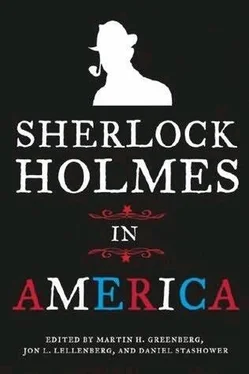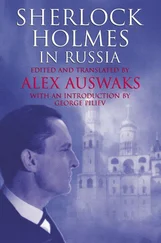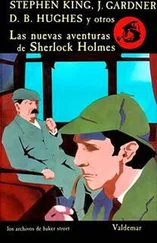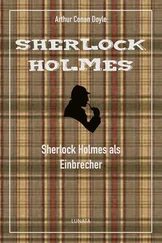“But Mr. Holmes, you were able to identify the murderer without looking at his face! I could hardly believe it!”
“Detective Dugan, I did this not to put on a spectacle, but because I knew nothing of what George Fitzbeck, or George Smith, looked like. A forger, by rule, is quite skilled at changing his appearance through small adjustments in habits of grooming and hygiene. However, knowing that he had fooled the police in Maine into transferring him to an insane asylum, I examined his hands and arms. Criminals wishing to appear insane will usually chew off their fingernails or make cuts across their wrists that appear to be suicidal marks but in fact remain superficial and harmless. These marks could not be concealed even three or four weeks later. Our man, I found, had both of these on him, and was taken in as a horse thief. Concluding that while in prison he had not yet heard that his encounter with Mary had left her dead, I counted on further confirmation of his identity on my mention of Mary’s decease-as you saw with your own eyes.”
“There is one point I don’t understand,” I interjected, turning to our hostess. “Mrs. Smith, when we arrived here you were quite adamant that a cat could not be taken out of this building unless it is to a permanent home. Yet, you allowed Mollie to come with us to be used as an accessory in this case.”
“I am not deaf to reality, Dr. Watson,” Mrs. Smith replied forthrightly. “Our donations in these first months have been far more modest than we will need for our organization to survive more than a year. There are men and women standing high in religious and charitable enterprises who would celebrate our demise, who say that caring for animals is an affront when so much money is needed for men, women, and children. Even though when we receive a gift of one hundred dollars it is considered news, but if the new library or an institution of art receives ten thousand dollars, it is met with a shrug. But we will pass that by. Mr. Holmes assuring me that the League would be publicly credited with helping to save an innocent man from prison and capture a murderer, I agreed to his bargain. If the public can see the cause of an animal helping people, and the cause of people helping animals, we shall one day find our acceptance.”
The two kittens, Miss Puff and Mollie, were now rolling around wildly and batting each other’s heads with their paws. Mrs. Smith picked them up, one in each hand.
“I should think, Mrs. Smith, that Dr. Lavey will be quite pleased to take good care of Mollie, seeing that she helped save him from the gallows. And that his jail stay has released him from the demon grip of opium,” Holmes said. “I shall make Mollie’s good care our only fee to him for our services.”
THE CASE OF THE RIVAL QUEENS by Carolyn Wheat
Carolyn Wheat’s short stories have won her an Agatha, an Anthony, a Macavity, and a Shamus Award. Her book How to Write Killer Fiction (Perseverance Press, 2003) is a must-have addition to any writer’s bookshelf. She teaches writing at the University of California, San Diego extension school and offers freelance editorial consulting services. She makes her home in San Diego and has added yoga and meditation to her teaching repertoire.

The Hotel del Coronado’s young bellboy was clearly overawed. Swallowing hard, he managed to squeak out the words, “Mr. Spalding would be grateful if you could spare him a moment, Mr. Holmes.”
The mulish look on Holmes’s face told me he had no intention of sparing Mr. Spalding, or anyone else, a moment. “We are here on holiday,” he said curtly. “I do not wish to be disturbed.” Holmes had taken against San Diego when he discovered that one of its more famous denizens, the legendary American lawman Wyatt Earp, had not gunned down evildoers in its city streets, but had instead opened an ice cream parlor. Holmes had formed his ideas of the American West from the pages of dime novels and seemed affronted at every sign of gentility.
The boy said, “But it’s Mr. Spalding, sir.”
Holmes raised a single eyebrow. “I have no memory of that name,” he said slowly, “which means Mr. Spalding is not a member of the criminal classes.”
The boy gasped. I stifled a laugh and put an end to Holmes’s ignorance. “In fact, Holmes, you have already made Mr. Spalding’s acquaintance. Don’t you remember the baseball game we saw in 1889? Mr. Spalding organized the tour and was the chief bowler. We were introduced to him at the reception following the game.”
“Pitcher,” the boy said with an air of reverence. “Mr. Spalding pitched for the Chicago White Stockings. He invented the Spalding twister.” At our blank looks, he explained, “It’s a curve ball. The batters never figured out how to hit it.”
“A googly,” I murmured. “I remember thinking the American game was faster than cricket. In fact, I thoroughly enjoyed our exposure to the American pastime.”
“I vaguely recall some outlandish sporting event you insisted I attend with you,” Holmes replied. He still lay at his ease on the chaise longue nearest the window, where the balmy Pacific breeze blew the sheer curtains to and fro. “I found it tedious in the extreme.”
“Mr. Spalding is not only well known as a player,” I said, realizing that I at least looked forward to meeting our visitor, “he is also the chief manufacturer of the balls used in the sport. He is, in short, a rich man and a leading citizen of San Diego.”
“Very well, Watson,” Holmes cried, leaping up from his place on the couch. “If it pleases you, we shall see this plutocrat.” He exchanged his smoking jacket for proper afternoon wear and we made our way from our room to the magnificent Otis lift that would whisk us to the lobby floor. The Hotel del Coronado was as up to date as any resort in Europe, a fact that Holmes found intensely annoying, as he’d been looking forward to swinging saloon doors and sawdust on the floor. Ridiculous, of course, in the second year of the twentieth century.
A waiter led us through the wood-paneled lobby to the terrace where tea was being served. It was open to the ocean breeze and looked out over the Pacific. I wondered at first that we were not shown to the bar, and then realized the reason: Mr. Spalding had brought his wife. Albert Spalding was a solid man with a bushy moustache and hair parted in the center. He wore a black suit with a high collar and a thickly knotted tie. His wife wore a walking suit of lavender festooned with ecru lace. Together they looked the picture of well-to-do American respectability.
We made introductions and ordered tea. I mentioned the historic baseball game in which I had seen Spalding play. He nodded perfunctorily, as if to indicate that sport was the furthest thing from his mind.
“Mr. Holmes,” he began after his wife had poured tea into each cup, “I am here on a matter of utmost importance. I would not dream of interrupting your holiday for anything less, I assure you. At first, I thought the matter was, well, a figment of my wife’s imagination, but of late I have come to agree with her. Something is amiss at the Brotherhood.”
“The Brotherhood?” Holmes looked as puzzled as I felt.
Spalding opened his mouth to reply, but his wife’s words came first. “The Universal Brotherhood and Theosophical Society,” she explained in a loud voice that would have been more appropriate on the lecture circuit. “Albert and I live on the grounds. I am very active in the Society.”
I had heard that a branch of the Theosophical Society made its home in San Diego. Strands of gossip, such as one overhears in hotels, came back to me. “Godless heathens,” I’d heard a woman say of the colony on Point Loma, “all dressed in white, dancing under the trees, speaking Greek.”
Читать дальше













